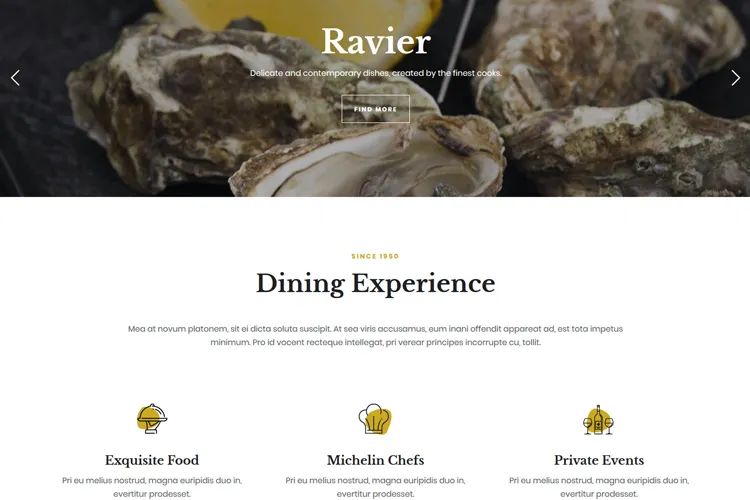The WordPress landscape shifted permanently in May 2025, creating game-changing developments that will impact every WordPress site owner. From security vulnerabilities that could destroy your business to AI features that could revolutionize how you build websites, these aren’t just random WordPress updates – they’re critical changes that demand immediate attention. This MatchThemes WordPress Roundup breaks down exactly what happened and the facts you need to protect and grow your WordPress business. Ready to dive into the most insane WordPress news from May 2025 that will shape the future of your website strategy.
Caverta Dine Site Demo

We launched the new Caverta Dine site demo as part of our latest Caverta WordPress restaurant theme update, marking a significant expansion of our pre-made demo collection. The Dine demo represents the seventh pre-made site design now available with the Caverta theme, joining the existing Main, Bar, Cafe, Pizza, Steakhouse, and Pastry demos to provide restaurant owners with even more specialized design options. This latest addition was introduced in version 2.1.4 of the Caverta theme, which also includes a new footer variation and full-screen pages with featured image background shortcode functionality. The Dine demo showcases MatchThemes’ commitment to providing diverse, industry-specific design solutions for the food service sector, offering restaurant owners a sophisticated template specifically tailored for upscale dining establishments.
WordPress Announces Formation of Dedicated AI Team
WordPress Announces Formation of Dedicated AI Team
In May 2025, WordPress announced the formation of a dedicated AI Team – its most significant move toward artificial intelligence integration to date. Led by experts from Automattic, Google, and 10up, including James LePage, Felix Arntz, Pascal Birchler, and Jeff Paul, the team aims to unify AI efforts across the platform while staying true to WordPress’s open-source values.
Adopting a plugin-first strategy, the team will release canonical plugins for rapid testing and iteration, enabling faster innovation outside of core releases. Their focus is on building robust infrastructure and standards that simplify AI integration for developers, rather than adding superficial features. With over 600+ related AI WordPress plugins already in the ecosystem, this initiative seeks to improve compatibility, reduce fragmentation, and accelerate adoption – especially as competitors like Wix and Shopify expand their AI capabilities. A public roadmap will guide the community and ensure transparency throughout the process.
OttoKit Plugin Exploited Immediately After Disclosure

In early May 2025, the widely used OttoKit WordPress plugin, installed on over 100,000 websites, became the target of mass exploitation shortly after a critical vulnerability was disclosed. The flaw allowed unauthenticated attackers to execute arbitrary code on affected sites, posing an immediate and severe threat to site owners. Security researchers had responsibly disclosed the vulnerability, but attackers were quick to weaponize it, leading to widespread site compromises. The vulnerability underscored the dangers of zero-day exploitation in high-usage plugins and the urgent need for immediate patching upon disclosure.
The developers of OttoKit responded rapidly, releasing version 1.0.83 to patch the flaw. However, the damage had already begun before many users had the chance to update. WordPress security firms issued urgent advisories recommending not just patching but also scanning for signs of compromise. This incident reignited debate within the WordPress community over the balance between transparency and exploitation timing in vulnerability disclosures, as well as the need for better auto-update mechanisms in plugins that power a large portion of the ecosystem.
WordPress 6.8.1 Maintenance Release
WordPress 6.8.1 Maintenance Release
WordPress rolled out version 6.8.1, as a short-cycle maintenance release, fixing 15 bugs across Core and the Block Editor to shore up stability. The update tackled glitches in the block editor’s JavaScript modules, resolved regressions in multisite file handling, and patched inconsistencies in REST API endpoints, ensuring smoother editing workflows and reliable networked site management. By packaging these fixes into a minor release, WordPress reinforced its commitment to risk-averse updates that maintain automatic background updates without introducing new files or large-scale changes.
This maintenance push underscores WordPress’s strategy of prioritizing platform robustness amid a pared-back major release cadence for 2025. With only one major release (6.8 “Cecil”) planned for the year, minor updates like 6.8.1 become critical vehicles for delivering bug fixes and performance enhancements that keep sites secure and functional. Users on automatic updates received these improvements seamlessly, while manual updaters could install 6.8.1 via the Dashboard in a single click.
Full Site Editing Becomes Standard Across WordPress Themes
Full Site Editing (FSE) officially matured into the cornerstone of WordPress theme development in 2025, shifting the landscape away from traditional theme files and third-party page builders toward a unified, block-based design experience .
Users can now fine-tune every corner of their websites – from headers and footers to navigation menus and page layouts—directly within the WordPress Site Editor, eliminating the need for custom code or multiple tools . Advanced features like native CSS Grid and Flexbox controls, combined with reusable block patterns, empower designers to create responsive, accessible layouts without writing a single line of CSS or PHP .
As block themes continue to proliferate and global style controls evolve, Full Site Editing is poised to remain the driving force behind WordPress’s commitment to user-first, code-free site building .
WPML Launches Private Translation Cloud
WPML Private Translation Cloud
WPML has unveiled Private Translation Cloud (PTC), an AI-powered translation service that claims to deliver better-than-human translations for WordPress themes and plugins.
This new tool integrates seamlessly with developers’ workflows by reading .PO and .POT files directly from GitLab, GitHub, or Bitbucket repositories.

Once processed, PTC automatically generates the corresponding .MO files for PHP backends and JSON files for front-end JavaScript components, streamlining the localization pipeline.
Beyond speed and ease of use, PTC claims context-awareness that far surpasses standard machine translation engines, maintaining consistency across large codebases and remembering project-specific glossaries. The Private Translation Cloud supports over 34 languages and offers simple, stable pricing with unlimited translations and no per-word fees. By automating pull requests for updated translation files back to the specified branch, PTC ensures continuous localization that adapts to code changes instantly.
WordCamp Jinja 2025: Recap
WordCamp Jinja 2025 wrapped up on May 25th at Jinja Senior Secondary School near the Nile River, drawing over 250 attendees – including students, developers, designers, educators, and entrepreneurs – from across East Africa . Under the theme “Create, Impact, and Explore with WordPress!”, the two-day conference combined beginner workshops, advanced talks, a charity hackathon, and a Contributor Day that saw participants contribute to global WordPress core, documentation, and polyglots projects.

Student-centered sessions introduced youth to open-source tools and digital literacy, sparking the formation of new ICT clubs on campuses . Parallel speaker tracks featured local and international experts presenting on accessibility, SEO, AI-driven content creation, and inclusivity in tech, highlighted by Sumaiya Nalukwago’s keynote inspiring female developers .
WordCamp organizers announced plans to alternate future venues between schools and innovation hubs, aiming to balance student engagement with professional development. The event’s legacy includes strengthened East African WordPress communities, new outreach initiatives like the Uganda Websites Projects Competition, and an open invitation to WordCamp Masaka 2025 – ensuring that the “Create, Impact, and Explore” spirit continues to drive regional tech growth .
May 2025 will be remembered as a transformative month for WordPress, marked by significant technological advances, security challenges that will shape the platform’s future for years to come. These developments reflect WordPress’s evolution from a simple blogging platform to a complex ecosystem serving nearly half of the internet.







